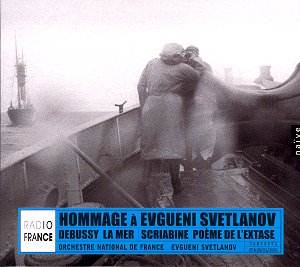This
is, quite simply, a remarkable disc. Two such heavily-perfumed
scores, written within three years of each other, prove a well-nigh
perfect coupling and provide an eloquent testimony to Svetlanov’s
stature as a conductor. When reviewing a Royal Festival Hall concert
in January 2002, I wrote of the ‘effortless ebb and flow’ (of
Rachmaninov’s Second Symphony) and, of Glinka’s ‘Ruslan’ overture,
‘most impressive, perhaps, was Svetlanov’s ability to balance
the textures carefully, even within fortissimo’ (http://www.musicweb-international.com/SandH/2002/Jan02/Glinka.htm).
Both qualities are presented in abundance on the present disc.
Svetlanov
died in May 2002, just a few months after the concert captured
here. Given the scarcity of conductors of his gifts, he will be
sorely missed. La mer on this occasion is an evocation
of the sea with such delicacy, mystery and power that it is quite
overwhelming. Couple this with Svetlanov’s ‘effortless ebb and
flow’ (the phrase taking on dual significance in the present instance,
of course) and this performance becomes a winner. It is simultaneously
easy to believe this is ‘live’ given the spontaneous outpouring
of the whole, but difficult to believe because of the high technical
standard of the orchestra. The opening is teasingly gentle; the
woodwind dances sinuously. Horns cut through the orchestra thrillingly,
and the overall brightening of textures is slow but utterly inevitable
due to the Svetlanov’s experienced handling of the score. The
climax, when it comes, is resplendent.
It
is the trumpets’ searing through the orchestra like musico-semiotic
signposts in the ‘Jeux de vagues’ that impresses most in this
second movement. Interestingly, the ‘Dialogue du vent et de la
mer’ is tremendously exciting and impetuous (a rough sea, this!),
caught on the wing, but textures remain ever a model of clarity.
Scriabin’s
Poème de l’extase opens in the most delicate of
fashions. Scoring, again, is miraculously, and meticulously, presented.
Muted horn calls sound as if Debussy’s Pelléas et Mélisande
has stepped into Schoenberg’s Pelleas und Melisande, a
memorable invocation. Everything is expertly delineated, Svetlanov
realising the build ups of melodic/thematic strands towards climax
points brilliantly. Textures become so lush one could get lost
in them, but they never once seem overcrowded. Scriabin’s magical,
phantasmagorical world is viscerally evoked. The end is very
loud: the expected cheers are there in abundance. The occasional
horn split along the way merely acts as part of the live experience.
Recommended
with enthusiasm.
Colin
Clarke
